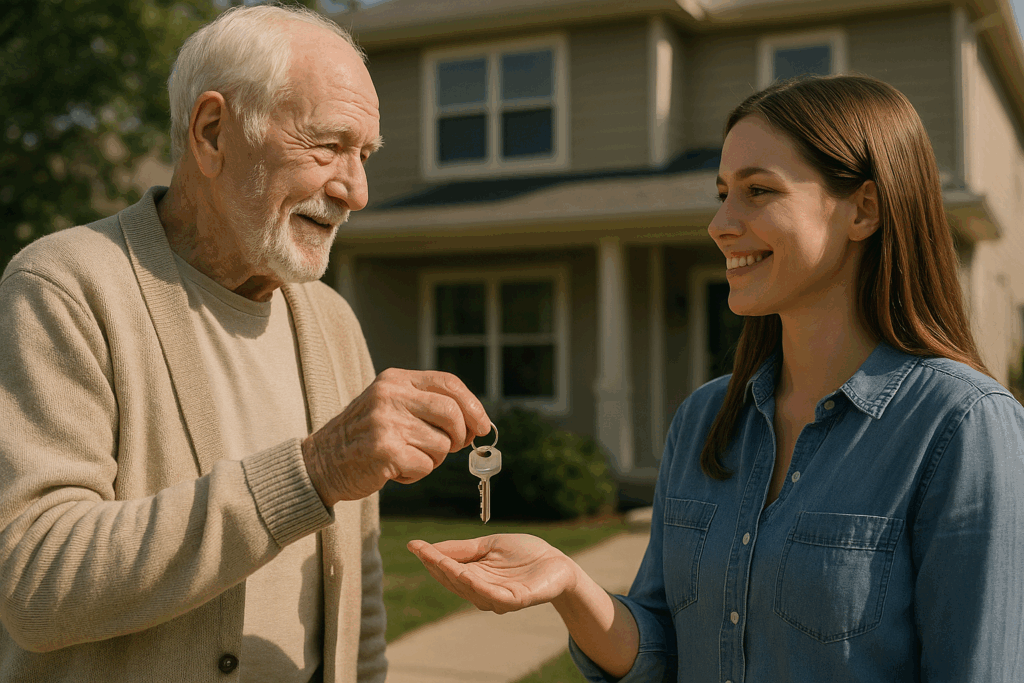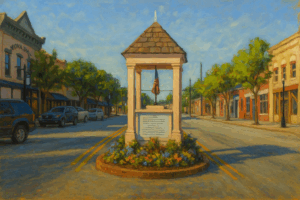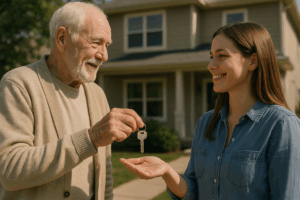How to Sell an Inherited Property in Georgia | Monroe GA Probate Real Estate Guide

Selling an Inherited Property in Georgia: What You Need to Know
Inheriting a house in Georgia can be both a gift and a challenge. On one hand, it’s a valuable asset and maybe a place filled with family memories. On the other hand, navigating a Georgia estate property sale involves legal steps, financial decisions, and often emotional stress. If you’ve found yourself responsible for an inherited home – whether in Monroe, GA or elsewhere in the state – you likely have questions about the process. How do you sell an inherited house in Georgia? What about probate, taxes, and selling the house as-is? This guide will walk you through what you need to know about selling an inherited property in Georgia, with clear steps and tips to make the process as smooth as possible. We’ll also address common FAQs and explain how Winston White Realty can help, so you can make informed decisions and ultimately turn this inherited property into an opportunity.
Understanding the Georgia Probate Real Estate Process
Before you can sell an inherited property, it’s crucial to determine how the property will legally transfer from the deceased to you (and any other heirs). This usually means probate – the court-supervised process of validating the will (if one exists) and settling the estate. In Georgia, probate is generally required for transferring ownership of a home if the property was solely in the deceased’s name . In other words, when the deceased is the sole owner of the real estate, it will have to go through probate before you can sell it .
During probate, the court will officially appoint an executor (if named in a will) or an administrator (if no will exists) to manage the estate . This person gains the authority to handle assets – including real estate – after the court’s approval. If the inherited house had a co-owner with a right of survivorship (for example, a spouse listed on the deed), the property may pass directly to the co-owner without probate. Likewise, if the deceased had placed the property in a living trust or used a Transfer-on-Death (TOD) deed (now allowed in Georgia as of 2024), the house can bypass probate and go straight to the named beneficiary . However, if no such estate planning measures were in place, you should expect to navigate the probate process.
How long does probate take? It varies, but in Georgia a probate estate can typically take 6–12 months to settle if there are no major disputes . This timeframe includes validating the will, notifying creditors, settling debts, possibly getting the property appraised, and obtaining the court’s permission to distribute or sell assets. It’s wise to consult a Georgia probate attorney to ensure you follow all requirements. Once you have the court’s go-ahead (often in the form of “Letters Testamentary” or “Letters of Administration”), you’ll be able to proceed with selling the house.
Tip: Secure the property during this interim period. Make sure insurance is in place, utilities are managed, and the home is kept in good condition. You may also begin organizing any personal belongings in the house, though avoid selling or giving away major assets until probate is further along (or get approval if required).
How to Sell an Inherited House in Georgia: Step-by-Step Guide
Selling an inherited home involves more than a typical real estate transaction. You’re handling not just a property, but also an estate. Here’s how to sell an inherited house in Georgia in a few key steps:
1. Confirm Legal Authority and Title – Before listing the home, ensure you have the legal right to sell it. If you’re the executor or court-appointed administrator, have the official documentation that authorizes you to act on behalf of the estate. Verify that the title can be transferred; this may involve completing probate or filing certain documents with the county. If multiple heirs are involved, all parties should agree on the sale (or you may need to buy out a reluctant heir or get a court order in extreme cases). Essentially, clear title is needed to attract buyers and complete a sale.
2. Assess the Property’s Condition and Value – Take a honest look at the home’s condition. Is it in good shape, or are there deferred maintenance issues? Many inherited properties are older homes that might need repairs or updates. Get a sense of what the house is worth in its current state. Consider ordering a professional appraisal or a Comparative Market Analysis (CMA) from a local real estate agent. (For a quick estimate, you can also use our free home valuation form to gauge your inherited home’s value in today’s market.) Knowing the approximate value will help you decide on pricing and whether any improvements are worth doing.
3. Decide on Repairs vs. an As-Is Sale – One big decision is whether to fix up the property or sell it “as-is.” An as-is inherited home sale in Georgia means you’re selling the house in its current condition, without making any repairs or upgrades, and the buyer accepts that they’ll handle any issues after closing. This option can be attractive if the house needs a lot of work or if you live far away and can’t oversee contractors. It saves you time and out-of-pocket costs, and you can typically close faster (investors and cash buyers often seek as-is deals). However, selling as-is might fetch a lower price than a fully updated home, since buyers factor repair costs into their offers. On the other hand, investing in strategic repairs or renovations could raise the sale price and appeal to more traditional buyers – but you’ll need to have the budget and time, and there’s always a risk of not recouping every dollar. Consider the Georgia real estate market conditions and talk to a realtor about which route makes sense. Often, heirs choose the simplest route due to the emotional and financial stress already in play. Bottom line: you can absolutely sell an inherited house as-is in Georgia, and many families do so to avoid extra hassle.
4. Clean Out and Prepare the House – Getting the property ready for sale is a key step. This often means sorting through the deceased’s personal belongings – a task that can be emotional and time-consuming. It may help to involve family in deciding which items to keep as mementos, and what can be sold or donated. Some estates hold an estate sale (or yard sale) to liquidate furniture, antiques, and other items of value. Once personal possessions are cleared out, give the home a thorough cleaning. Even if you’re selling as-is, a clean and uncluttered space can make the property more appealing to buyers. If needed, handle any simple maintenance like yard cleanup – first impressions matter. For those planning to list on the open market, you might even do light staging of the home to help buyers envision its potential.
5. Work with a Knowledgeable Real Estate Agent – While it’s possible to sell on your own or to an investor, teaming up with a real estate professional is highly beneficial when selling an inherited property. An experienced agent (especially one familiar with estate sales in Georgia) will guide you through pricing, marketing, and negotiations, all while being mindful of the unique circumstances of an inherited sale. They’ll help you navigate disclosures and any extra paperwork (for example, providing a copy of the probate court order or executor’s deed to prove you can sell). A local agent can also advise on whether to do minor improvements or if an as-is sale would be better given the buyer pool in your area. When you’re already juggling legal and family matters, having a professional handle the sale can bring peace of mind and better results. (Winston White Realty has helped many families in Northeast Georgia through situations just like this – from pricing an inherited home correctly to coordinating quick, hassle-free sales. More on that below.)
6. List and Market the Property – Once you’re ready, your agent will list the home for sale on the MLS and market it to attract buyers. In your listing description, it’s wise to mention that it’s an estate sale or being sold as part of an estate, especially if you intend to sell as-is. This signals to buyers that the sellers might prefer a streamlined closing. Marketing may include professional photos, virtual tours, and highlighting the home’s features (and large lot or great location in Monroe, etc.). If the house is older or needs work, investors and flippers could be a target audience; alternatively, if it’s in good shape, you’ll aim for regular owner-occupant buyers. Be prepared for offers that could be lower than you hoped, particularly from cash investors. Your agent will help you evaluate offers and negotiate the best possible price and terms on your behalf.
7. Complete the Sale and Settle the Estate – Once you accept an offer, the closing process will begin. In Georgia, closings typically involve an attorney who will handle the title transfer and ensure any liens or debts are paid off. For an inherited property, it’s common to use the sale proceeds to pay any remaining estate expenses – for example, outstanding property taxes, the mortgage balance, or final utility bills. (Any valid liens or debts tied to the house should be cleared at closing from the sale funds.) After closing, the net proceeds can be distributed to the heirs as dictated by the will or Georgia’s inheritance laws. Be sure to keep documentation of the sale for tax purposes. Selling an inherited house can feel like crossing the finish line of a long race – once it’s done, you’ve not only converted the property into cash value but also honored your duty in settling your loved one’s estate.
Throughout these steps, keep communication open with any co-heirs or family members involved. Clear communication helps avoid misunderstandings or conflicts, especially about the sale price and division of proceeds. If disagreements do arise (for example, one sibling wants to keep the house while others want to sell), you may need the help of a mediator or attorney to reach a resolution. In Georgia, all heirs generally must agree to sell inherited real estate, or a court can intervene to order a sale if an agreement can’t be reached . It’s far better if families can work it out amicably.
Local Market Insights: Selling an Inherited House in Monroe, GA
Selling an inherited home isn’t just about the house itself – it’s also about the market where the house is located. Monroe, Georgia (and the surrounding Northeast GA area) has its own real estate trends and buyer demand that can influence your selling strategy. The good news is that our area’s housing market has been relatively strong. As of early 2025, for example, median listing prices in Walton County (which includes Monroe) were up about 3.5% year-over-year . This means there’s steady demand, and you’re likely to find interested buyers for a well-priced home. Monroe sits in a desirable spot between Atlanta and Athens, offering small-town charm with reasonable commute distances – so both local move-up buyers and newcomers relocating from the city may be looking for homes here.
That said, pricing your inherited property correctly is key. If the home is older or needs work, the Monroe market may price it lower compared to renovated homes in the area. A CMA (Comparative Market Analysis) from a local agent will show what similar properties in Monroe and Walton County have sold for recently, which helps in setting a realistic asking price. Remember that Georgia probate real estate process considerations might mean you’re selling a little later than you’d like – if the market has shifted in the months since the owner’s passing, you’ll need current data (our team can provide up-to-date market insights). Also, consider who your likely buyer is: In Monroe, if the property is downtown or historic, you might attract buyers looking for a fixer-upper to restore, whereas a suburban-style house might draw families looking for move-in ready homes. Tailoring the marketing to the local buyer pool can make a big difference.
Lastly, don’t underestimate the value of local expertise. Every market has its quirks – maybe Monroe buyers prefer certain loan types or there are seasonal slow-downs to plan around. Working with a real estate agent who knows Monroe, GA ensures you get guidance specific to our community. They’ll know, for instance, how to highlight the large pecan tree in the yard that a Monroe buyer would love, or how to navigate Walton County’s required documents at closing. In short, combine estate sale know-how with local market know-how for the best outcome.
Financial and Tax Considerations for Inherited Properties
One of the big questions when selling an inherited house is: What are the tax implications? The good news is that inheriting property generally does not mean a huge tax bill at sale in most cases, but you should still be informed about a few key points:
- Stepped-Up Basis & Capital Gains: When you inherit a home, the IRS allows a “step-up” in cost basis. This means for tax purposes, the value of the property is “stepped up” to the fair market value at the date of the decedent’s death . Why does this matter? Because if you turn around and sell the house, your taxable gain (if any) is calculated based on the difference between the sale price and that stepped-up basis. For example, say your father bought the house decades ago for $100,000, and it was worth $250,000 when you inherited it. If you sell it for around $255,000, your taxable gain is only about $5,000 (255k minus the 250k basis), not $155,000. In fact, if you sell the home for less than or equal to the value at inheritance, you likely won’t owe any capital gains tax. You only pay capital gains on the amount the sale price exceeds your basis . This is a significant relief for most inherited property sales. (Note: If the property value increases after you inherit – for instance, due to market appreciation or renovations you do – then that increase could be subject to capital gains tax.) Keep good records of what the home’s value was when you inherited it; an appraisal at time of inheritance is ideal documentation.
- Home Sale Tax Exclusion: You may have heard that when you sell a primary residence, you can exclude up to $250,000 of gain ($500,000 for a married couple) from capital gains tax. However, this exclusion does NOT automatically apply to inherited properties. To qualify, you would need to own and occupy the home for at least two years as your primary residence, meeting the IRS’s ownership and use tests . Most people inheriting a house plan to sell it rather than move in for two years, so in most cases the $250k exclusion won’t be usable. But again, because of the stepped-up basis discussed above, many inherited home sales don’t have large gains anyway. If you do decide to live in the home for a couple of years before selling, you could potentially take advantage of that exclusion – it’s something to discuss with a tax advisor if that scenario fits your goals.
- State Taxes: Georgia does not have a state inheritance or estate tax on the property for most estates . (The old Georgia estate tax was effectively phased out for deaths after 2004 .) That means you generally won’t owe Georgia any special tax just for inheriting or selling the house. You will, however, pay the standard Georgia transfer tax at closing (often $1 per $1,000 of the sale price, typically a small amount) and of course, if there were any owed property taxes or liens, those need to be settled. Always ensure property taxes on the home are up to date through the sale closing. If the estate is still open at the time of sale, the estate may cover prorated property taxes up to the sale date.
- Other Costs: Consider that the estate (or you as the new owner) is responsible for ongoing costs until the home is sold. This includes homeowner’s insurance, utilities, property maintenance, and possibly mortgage payments (if the home had a mortgage). If the deceased had a mortgage on the property, usually the loan must be paid off when you sell the house – the proceeds from the sale will go toward that. Heirs should communicate with the lender during the probate process; many loans have a clause requiring full repayment upon transfer, but federal law often prevents immediate foreclosure if an inherited home transfers to a relative. In practice, most heirs either continue making payments until the sale or work out a payoff with the sale proceeds. Also, if you sell the home with the help of a real estate agent, factor in realtor commissions and closing costs (which typically come out of the sale proceeds at closing).
One smart move is to consult with a tax professional or financial advisor before finalizing the sale. They can give personalized advice on your situation – especially if the property is high in value or if you’re considering alternatives like renting it out instead of selling. But overall, the tax burden for selling an inherited house in Georgia is often much less intimidating than people fear, thanks to the step-up in basis and lack of state inheritance tax.
Working with a Real Estate Professional (Why Choose Winston White Realty)
Selling a home that you’ve inherited isn’t just a regular real estate deal – it can be more complex, and certainly more emotional. Having a knowledgeable, empathetic real estate professional by your side can make a world of difference. Here’s why working with an agent (especially a local expert from Winston White Realty) can help you sell an inherited house in Monroe, GA or anywhere in Northeast Georgia smoothly:
- Expert Guidance and Peace of Mind: A good realtor will guide you through each step – from understanding the Georgia probate real estate process to pricing the home correctly and marketing it effectively. They’ll help ensure all the necessary documents (like affidavits of heirship, court authorizations, etc.) are in order for a legal sale. This guidance is invaluable when you’re dealing with an unfamiliar process while also handling personal matters.
- Accurate Pricing and Marketing Strategy: As mentioned, pricing an inherited property can be tricky. Emotions might make you value it higher, or the as-is condition might make it seem lower. Winston White Realty’s team knows the Northeast Georgia market and will prepare a detailed analysis to determine the optimal listing price. We’ll also advise on any quick fixes that could boost value or whether it’s best to sell as-is to maximize your net. Our marketing will spotlight the home to the right buyer audience – whether that’s highlighting an “investment opportunity” for a fixer-upper or showcasing beautiful family-home potential in a move-in ready house. With professional photos, staging tips, and online/offline marketing, we ensure your inherited property gets the attention it deserves.
- Local Network and Resources: Selling an inherited home might involve extra steps – maybe you need a junk removal service, an estate sale organizer, a handyman for minor repairs, or a reputable attorney for probate questions. As a Monroe-based brokerage, we have a strong network of local professionals we can refer you to. We can coordinate with estate attorneys and ensure that the real estate transaction aligns with the estate’s needs and timelines. Our goal is to take as much off your plate as possible.
- Empathy and Understanding: Most importantly, we approach inherited property sales with care and empathy. We understand that this isn’t just a transaction; it’s often a chapter of someone’s life you’re closing. Our team will handle the sale with sensitivity to your family’s situation. We’ll communicate clearly and frequently so you always know what’s happening, and we’re happy to answer any questions – no question is too small. At the same time, we remain professional and results-driven, keeping our eyes on getting you the best outcome (and highest return) for the property.
- Convenience and Conversion for You: Ultimately, partnering with a real estate agent lets you focus on your family and obligations while the agent focuses on the sale. For example, at Winston White Realty we can arrange showings around your schedule, handle negotiations with buyers (which can sometimes get emotional for sellers – we act as a buffer to keep things business-focused), and manage the myriad of paperwork from contract to closing. By having us handle the heavy lifting, you reduce the risk of mistakes or delays and increase the likelihood of a successful sale. Our track record in Monroe and the broader region speaks for itself – we’ve helped numerous clients turn inherited properties into positive outcomes.
If you’re considering selling an inherited home in Monroe or anywhere in Northeast Georgia, we’d be honored to assist. You can learn more about our team and approach on our website. When you’re ready, reach out for a consultation – even if you’re still in the early stages of deciding, we can provide insight and a free valuation to help you weigh your options.
(Internal Note: Insert internal links to About/Contact/Valuation as needed above.)
FAQ: Selling an Inherited Property in Georgia
Q: Do I have to go through probate to sell an inherited house in Georgia?
A: In most cases, yes. If the deceased was the sole owner of the house, the property becomes part of their estate and must go through probate court before it can be sold . The probate process legally transfers ownership to the heirs or executor, who can then sell it. Exceptions would be if the home was jointly owned with a right of survivorship (then it passes directly to the surviving owner) or if the property was in a trust or covered by a Transfer-on-Death deed, which bypass probate. Always verify that you have the proper authority (e.g., court-issued documents) to sell the home. If you’re unsure, consult a Georgia probate attorney or ask your real estate agent for guidance.
Q: What taxes will I have to pay when I sell an inherited property?
A: Typically, you won’t owe estate or inheritance taxes to the state of Georgia on an inherited home sale , and any federal estate taxes would be handled by the estate before you receive the property (most estates are not large enough to trigger federal estate tax). When you sell, the main tax to consider is capital gains tax. Thanks to the “stepped-up basis” rule, your starting basis is the home’s market value at the time of inheritance . So you would only owe capital gains tax if the home’s sale price is higher than that inherited value . For example, if the home was valued at $200,000 when you inherited it and you sell for $210,000, you have a $10,000 capital gain. If you sell at $200,000 or below, there’s no gain. Most people selling inherited houses soon after inheriting don’t see large gains and thus have little or no tax to pay. One thing to note: the special $250,000 exclusion (for avoiding capital gains on a primary residence sale) usually does not apply unless you actually live in the inherited home for at least two years . Always check with a tax professional for your specific situation, but overall the tax burden is often minimal.
Q: Can I sell an inherited house “as-is,” or do I need to fix it up first?
A: You can absolutely sell an inherited house as-is in Georgia. Selling “as-is” means you make no repairs and the buyer accepts the home in its current condition. This is common with inherited properties, especially if the home is older or needs significant repairs. The advantage is a faster sale with less upfront cost to you – no dealing with contractors or spending money on renovations. There are plenty of buyers (including cash investors) who specifically look for as-is properties. The trade-off is that your sale price will reflect the work the house needs; you might get a bit less than if it were fully updated. However, sometimes making selective improvements (like fixing a major leak or safety issue, or even just fresh paint and yard cleanup) can broaden your buyer pool and increase offers – it really depends on the situation. A local real estate agent can advise you on which, if any, repairs are worth doing. But if you don’t want to invest more into the home, rest assured you can list it as-is. Just be upfront in disclosures about known issues, and price it appropriately for the condition. Many estate sales are done this way successfully.
Q: What if I inherit a property along with my siblings or other family members?
A: When multiple people inherit a house together, all co-heirs generally have to agree on the sale. You basically become co-owners (often as “tenants-in-common” if not specified otherwise), each holding a share of the property. To sell the house, you’ll need everyone’s cooperation to sign the deed at closing. It’s wise to have an open conversation early on – does everyone want to sell? Perhaps one sibling wants to keep the house or buy out the others’ shares. If one heir wants to keep the property and others want to sell, that heir could refinance the house in their own name and pay the others their share of the equity. If there’s disagreement and no one budges, as a last resort, an heir can petition the court for a partition sale, forcing the sale of the property so proceeds can be divided. This is a complex and relationship-straining process, so try to avoid it. Communication is key: come to a mutual agreement on what to do with the property. In many cases, heirs do choose to sell and split the proceeds, as it’s the simplest resolution. If you all agree to sell, you can appoint one person (e.g., the executor) to handle the logistics, but everyone will need to sign off on the final sale. A real estate agent and possibly a mediator or attorney can help facilitate a fair plan that everyone is comfortable with.
Q: Is it better to hire a real estate agent or try to sell an inherited property myself?
A: While you can try to sell it yourself (For Sale By Owner) or directly to a cash buyer, hiring a real estate agent is often the better choice, especially for an inherited property sale. An agent brings expertise in pricing (so you don’t accidentally underprice a home that has hidden value, or overprice and get no offers), marketing reach to find the right buyers, and negotiation skills to maximize your proceeds. They also handle the piles of paperwork and ensure you meet all legal requirements – which can be a relief when dealing with probate or multiple heirs. In an inherited sale, emotions can run high and complexities can pop up (like liens, title issues, or needed repairs). An experienced agent acts as your project manager and advocate, making the process much less overwhelming for you. Statistics show that homes sold with an agent often net a higher final price even after commissions, because the agent can attract more competition among buyers. Moreover, with a local agent (like Winston White Realty), you get area-specific knowledge and a network of professionals (contractors, attorneys, etc.) who can assist if needed. Our advice: at least consult with a realtor before deciding – most will offer a free consultation. You might find that their services pay for themselves in time saved, stress reduced, and a top-dollar sale.
Selling an inherited property in Georgia is a journey that blends legal steps, financial decisions, and emotional moments. But with the right information and support, you can navigate it successfully. This guide has covered the fundamentals – from probate and pricing to as-is sales and taxes. Every situation is unique, so don’t hesitate to seek personalized advice for your circumstances. If you’re in Northeast Georgia or Monroe, the team at Winston White Realty is here to help you through every step of the process. We combine professional expertise with genuine compassion, because we know what this process means to you and your family.
Ready to take the next step? Feel free to contact us for a no-obligation consultation about your inherited property. We can provide a customized home valuation and discuss the best strategy for your sale – whether you choose to list on the market or explore a quick as-is sale. Our goal is to make this experience as smooth and positive as it can be, turning a potentially stressful situation into a successful outcome.
You don’t have to navigate selling an inherited house alone. Let our local experts lighten the load and help you move forward.
Contact Winston White Realty
Winston C. White






